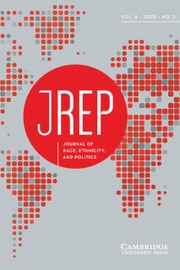No CrossRef data available.
Article contents
White Racial Identity, Racial Attitudes, and Latino Partisanship
Published online by Cambridge University Press: 21 September 2023
Abstract
While partisanship in American politics has been historically tied to racial identity and racial attitudes, most studies of Latino partisanship do not incorporate these factors into understanding their partisan attachments. I argue that the concepts of race, color, and mestizaje as they are understood within Latino communities in the United States can influence political attitudes and partisanship among Latinos themselves. Using six consecutive Cooperative Election Study (formerly Cooperative Congressional Election Study) surveys I examine how self-identification as white, racial resentment, and color-blind attitudes influence Latino partisanship. I find that white racial identity has a small but significant positive association with Republican partisanship among Latinos, and a negative association with Democratic partisanship. Additionally, negative racial attitudes among Latinos are strongly related to identification as Republican, even when controlling for ideology and other factors like immigrant generation and religion. These results have important implications for understanding current and future Latino voting patterns.
- Type
- Research Article
- Information
- Copyright
- © The Author(s), 2023. Published by Cambridge University Press on behalf of The Race, Ethnicity, and Politics Section of the American Political Science Association




